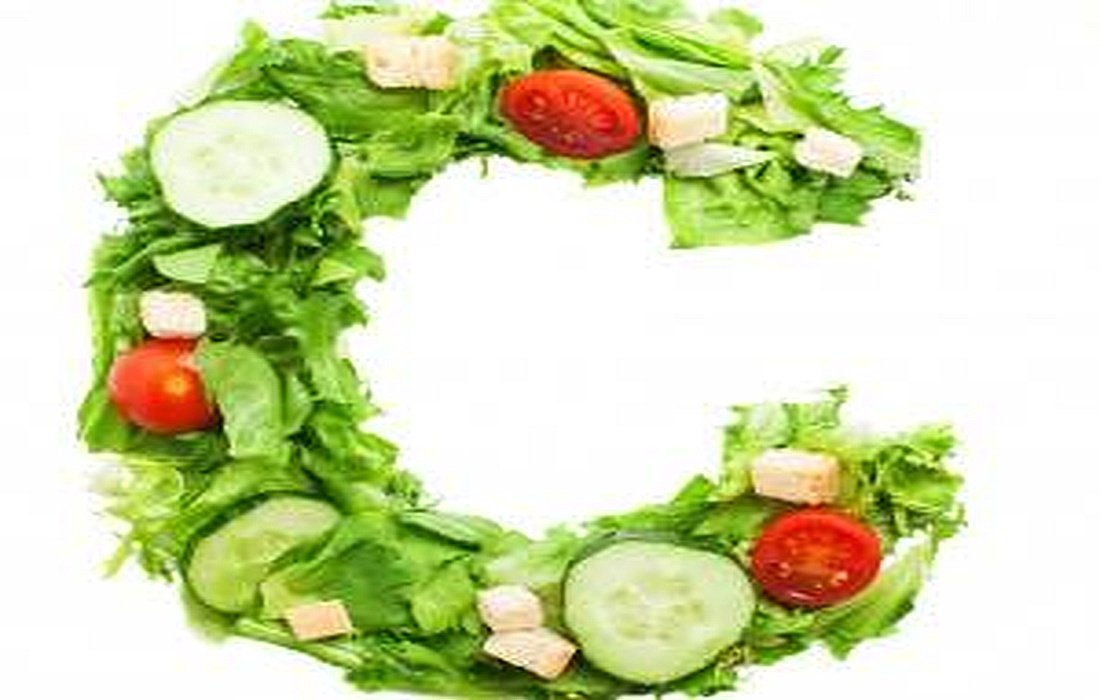What is vitamin C? What benefits does it have?
Vitamin C (also known as ascorbic acid) is abundant in vegetables and fruits. This water-soluble vitamin and strong antioxidant helps in bodily formation and maintains tissues, including bones, blood vessels, and skin.Vitamin CLet’s discuss.

What does vitamin C do in the body?
Vitamin C helps repair and regenerate tissues and protects against heart diseases. It aids in iron absorption and prevents scurvy, reducing “bad” cholesterol and triglycerides.
Research shows that vitamin C protects against free radicals and various cancers while helping neutralize the effects of nitrates (preservatives that may increase cancer risk).Processed foodsVitamin C can reduce symptoms of colds, prevent cataracts, and improve immune system function.ColdIt reducesCataractsImproves immune response.
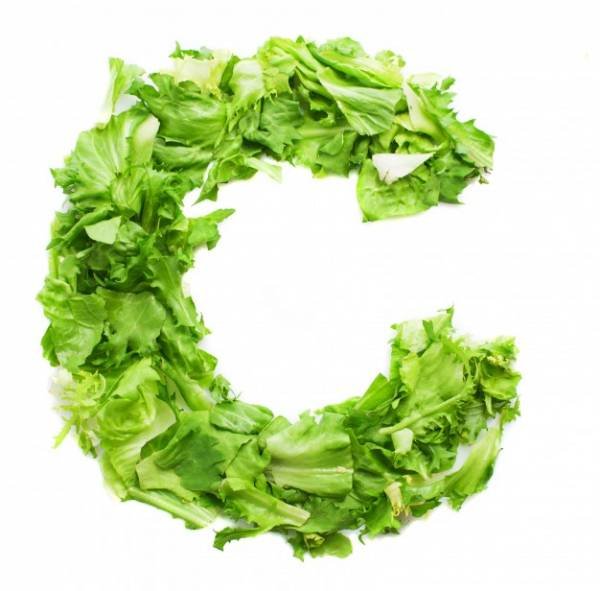
Vitamin C needs vary by age
According to the National Institutes of Health, the daily recommended intake of vitamin C for adults over 19 years is:
- Men: 90 mg per day
- Women: 75 mg per day
- Pregnant women: 85 mg per day
- Lactating women: 120 mg per day
Smokers should take more vitamin C. Doctors recommend a daily intake of 250 mg of vitamin C.

What amount of vitamin C do children need?
NIH recommends adequate intake (AIs):
- Infants 0-6 months: 40 mg per day
- Infants 7-12 months: 50 mg per day
The recommended intake of vitamin C for teenagers and children is:
- Toddlers 1-3 years: 15 mg per day
- Children 4-8 years: 25 mg per day
- Children 9-13 years: 45 mg per day
- Adolescents 14-18 years (male): 75 mg per day
- Adolescents 14-18 years (female): 65 mg per day

Signs ofVitaminC deficiency and symptoms of reduced vitamin C in the body:
Symptoms of deficiency include fatigue, muscle weakness, joint and muscle pain, bleeding gums, and leg rashes. Long-term deficiency can lead to scurvy, a rare but potentially serious disease. Other symptoms of vitamin C deficiency include:
1. Rough, dry skin
Vitamin C plays a crucial role in collagenproductionas it is a protein involved in connective tissues like skin, hair, joints, bones, and blood vessels. When vitamin C levels are low, a skin condition known as keratosis pilaris develops.
In this condition, “chicken skin”forms on the back of the arms, thighs, or buttocks due to keratin build-up within hair follicles. Keratosis pilaris due to vitamin C deficiency typically develops after three to five months of inadequate intake and resolves with supplementation.
2. Male pattern baldness
Vitamin C deficiency can also lead to hairgrowththat is bent or twisted due to structural defects in hair proteins during growth.
This hair condition is a significant sign of vitamin C deficiency, but as mentioned in the health section of SelMagz, it may not be obvious, as damaged hair is more likely to break;Hair lossresolves within a month of adequate vitamin C intake.3. Bright red folliclesHair follicles on the skin contain many small blood vessels that supply blood and nutrients to the area. When the body is deficient in vitamin C, these tiny blood vessels become fragile and break easily, causing red spots around the hair follicles.

This is known as bleeding and is a severe sign of vitamin C deficiency. Vitamin C supplementation usually resolves this symptom within two weeks.
4. Spoon-shaped nails with red spots or lines
Spoon-shaped nails are characterized by a concave shape and are often thin and brittle. They are more commonly associated with
anemia
caused by iron deficiencybut are also linked to vitamin C deficiency. Red spots or vertical lines in the nail bed, known as bleeding, can also result from vitamin C deficiency.5. Dry and damaged skin
Healthy skin contains a high amount of vitamin C, especially in the epidermis or outer layer of the skin. Vitamin C keeps the skin healthy and protects against oxidative damage from sunlight and exposure to pollutants like cigarette smoke or ozone. It also enhances collagen production, rejuvenating the skin.
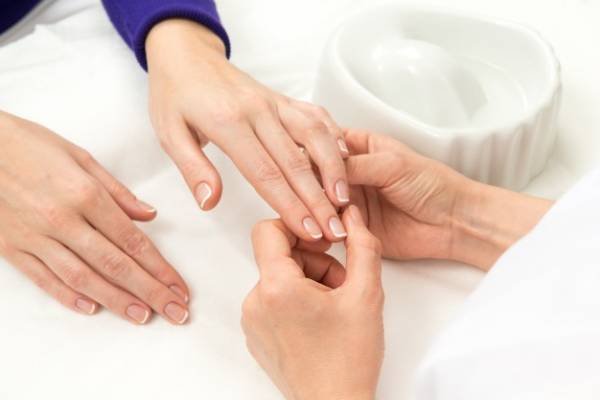
A higher intake of vitamin C is associated with better skin quality, while lower consumption correlates with a 10% increased risk of dryness and wrinkles, while dry and damaged skin can be linked to vitamin C deficiency.
6. Bruises
Bruising occurs when blood vessels under the skin break, leading to bleeding in the surrounding area. Bruising is a common sign of vitamin C deficiency, as poor collagen production results in weak blood vessels. Previously, in the health section of SelMagz, it was mentioned that deficiency-related bruising may occur in large areas of the body or appear as small purple spots beneath the skin.
Easy bleeding is often one of the first obvious signs of deficiency and should prompt further investigation of vitamin C levels.
7. Wounds heal slowly
Since vitamin C deficiency reduces collagen formation, wounds heal slowly.

Research has shown that people with chronic non-healing wounds are more likely to have vitamin C deficiency compared to those with chronic wounds. In severe cases of vitamin C deficiency, old wounds may even reopen, increasing the risk of infection. Gradual wound healing is a sign of deficiency.
8. Swollen joints
Since joints contain a high amount of collagen, they can be affected by vitamin C deficiency.
Many reported cases of joint pain due to vitamin C deficiency are often severe enough to cause difficulties in walking. Bleeding within the joints may also lead to additional swelling and pain for individuals with vitamin C deficiency. However, both of these symptoms can be treated with vitamin C supplements and usually resolve within a week.
9. Weak bones
Vitamin C deficiency can also affect bone health. In fact, low intake is associated with an increased risk of fractures and
osteoporosis

Research indicates that vitamin C plays a vital role in bone formation, so its deficiency may result in reduced bone density.
Children’s skeletons may be particularly affected by vitamin C deficiency as they are still growing and developing.10. Bleeding gums and tooth lossRed, swollen gums that bleed are another sign of vitamin C deficiency. Insufficient vitamin C weakens and inflames the gum tissue, making blood vessels prone to bleeding. In advanced stages of vitamin C deficiency, gums may turn purple and necrotic. Eventually, teeth can fall out due to unhealthy gums.
11. Weakened immune system
Studies indicate that vitamin C resides within various immune cells, helping them combat infections and eliminate pathogenic agents.
Vitamin C deficiency is associated with a weakened immune response and increased risk of infections, including serious illnesses like pneumonia, as highlighted in the following health section of SelMagz. Indeed, many individuals suffering from anemia, a condition caused by vitamin C deficiency, ultimately succumb to infection due to their weakened immune system.

12. Iron deficiency
Vitamin C deficiency and iron deficiency anemia often occur together.
Symptoms of anemia
Iron deficiency
include fatigue, weakness, shortness of breath during exercise, dry skin, dry hair,headaches and spoon-shaped nails.Vitamin C deficiency also increases the risk of excessive bleeding, which can contribute to anemia.13. Fatigue and malaiseTwo of the earliest signs of vitamin C deficiency are fatigue and malaise. While fatigue and irritability may manifest as early signs, they usually resolve within a few days of adequate intake or within 24 hours with high-dose supplementation.
14.

Weight gain
Vitamin C may help regulate fat from fat cells, reduce stress hormones,
and protect against obesity.Interestingly, low blood levels of vitamin C are linked to higher amounts of
abdominal fateven in individuals with normal weight. While excessive body fat is not sufficient to indicate vitamin C deficiency, it may need to be assessed after other factors are ruled out.15. Chronic inflammation and oxidative stress
Vitamin C is one of the most crucial water-soluble antioxidants in the body. It helps prevent cellular damage by neutralizing free radicals that can cause oxidative stress and inflammation in the body.Oxidative stress and inflammation are linked to many chronic diseases, including heart disease anddiabetes
so reducing levels may be beneficial. Low vitamin C intake is linked to higher levels of inflammation and oxidative stress, with increased risk of heart disease.
A study showed that adults with the lowest blood levels of vitamin C were nearly 40% more likely to experience heart failure compared to individuals over 50 years old, even if they were vitamin C deficient.
Foods rich in vitamin C and natural sources:Getting vitamin C through food is easy, as many fruits and vegetables contain it. Good sources include: apples, asparagus, various berries, broccoli, cabbage,melons
, cauliflower, citrus fruits (lemons,

oranges
kiwi
or
abdominal painavoid consuming it.Guava:Ripe guava is one of the richest sources of vitamin C among fruits, containing 228.3 mg of vitamin C per 100 grams or 126 mg of vitamin C per guava. Therefore, if you consume oneguava
you don’t have to worry about meeting your daily vitamin C needs. Here are various ways to include it in your daily diet.
Yellow pepper:Yellow pepper is considered one of the largest vegetables containing vitamin C. Add yellow pepper to salads, sandwiches, etc. You can also add chopped yellow pepper topasta
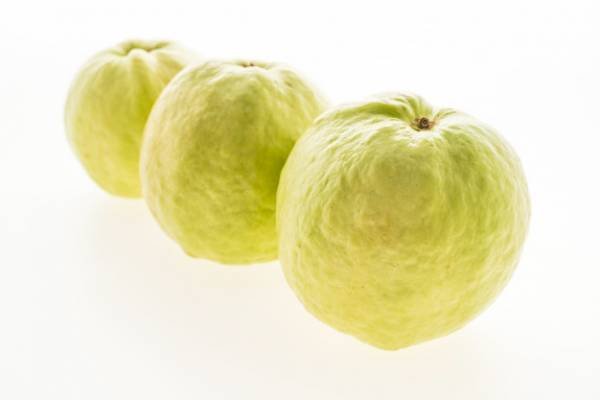
and chopped mushrooms for a delicious and healthy meal.
Parsley:This herb contains the highest amount of vitamin C, with 5 mg of vitamin C per tablespoon. It not only adds flavor and aroma to food but also boosts immunity. Therefore, include parsley in your daily diet.Red bell pepper:
Red bell pepper is rich in vitamin C. Did you know that 100 grams of red bell pepper contains 128 mg of vitamin C!
Cabbage:

Cabbage is also considered one of the popular vegetables. It contains 120 mg of vitamin C per 100 grams, significantly higher than a cup ofchopped spinach
Kiwi:
Kiwi is a delicious tropical fruit containing 92.7 mg of vitamin C per 100 grams or 70.5 mg of vitamin C per medium kiwi. It has a sweet and sour taste and soft texture.Kiwiis also an excellent source of vitamin A, dietary fiber, calcium,
magnesium
andpotassium.Broccoli:100 grams of this highly nutritious vegetable contains 89.2 mg of vitamin C. There are various ways to include broccoli in your diet.Cloves:Cloves are primarily used as a spice in cuisines of India, Pakistan, Bangladesh, Sri Lanka, Tanzania, and Madagascar. They add flavor and aroma to dishes. They have anti-inflammatory, antiviral, and antiseptic properties and are also useful fortoothache
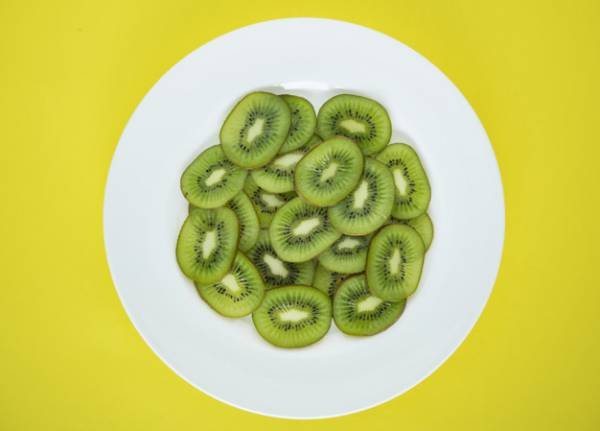
100 grams of cloves contain 80.8 mg of vitamin C.
Kohlrabi:
Kohlrabi can be eaten raw or cooked. It is similar to broccoli, cabbage, and Brussels sprouts and contains dietary fiber and vitamin C. One cup of it contains 83.7 mg of vitamin C, vitamin A, phosphorus, and calcium.
Papaya:Raw papaya is a good source of vitamin C, containing 61.8 mg of vitamin C per 100 grams, and onesmall papayacontains 93.9 mg of vitamin C. They also contain vitamin A, dietary fiber, calcium, potassium, and omega-3 fatty acids.Strawberries:
Strawberries need no introduction—now there’s another reason to include strawberries in your diet: 100 grams of strawberries contain 58.8 mg and one large strawberry contains 10.6 mg of vitamin C. They are also a good source of fiber, protein, and dietary fiber.
Oranges:
Oranges are one of the most popular citrus fruits with high vitamin C content—100 grams of oranges contain 53.2 mg of vitamin C and one large orange contains 97.9 mg of it.
Lemons:Lemons are a type of citrus fruit, so they are a good source of vitamin C—100 grams of lemon contain 53 mg of vitamin C, while one lemon contains 29.1 mg. They are also low in calories.Pineapple:
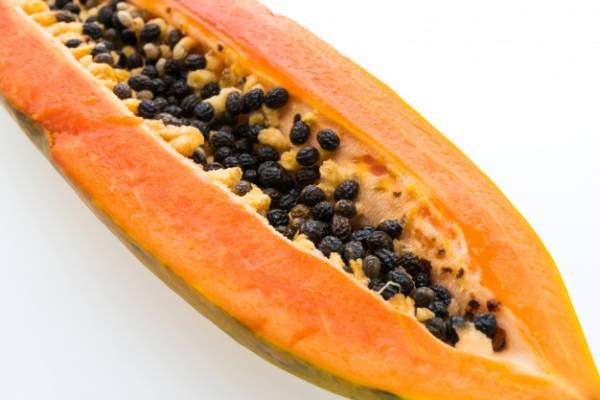
Pineapple is a sweet tropical fruit that turns bright yellow when ripe. One cup of pineapple contains 78.9 mg of vitamin C, while 100 grams contain 47.8 mg. It is also a good source of vitamin A, calcium, potassium, and dietary fiber.Cauliflower:
100 grams of cauliflower contain 46.4 mg of vitamin C and are also rich in protein, calcium, vitamin K, potassium, and phosphorus.
Cantaloupe:
Cantaloupe contains vitamins, minerals, and fiber, and potassium. They are anti-inflammatory and assist in cell hydration. One hundred grams contains 36.7 mg of vitamin C, while one ounce contains 10.3 mg.
Grapefruit:
It is well known that grapefruit aids in
weight lossBut did you know this fruit can also help improve immunity? This is because 100 grams of grapefruit contain 31.2 mg of vitamin C, while half a grapefruit contains 38.4 mg of vitamin C. They are also rich in vitamin A, calcium, potassium, phosphorus, and dietary fiber.
Spinach:

Spinach can make you stronger! It is not only a good source of protein, vitamin A, fiber, calcium, potassium, and magnesium, but it also contains adequate amounts of vitamin C—100 grams of spinach contain 1.8 mg of vitamin C, while a bunch contains 95.5 mg of vitamin C.
Mango:Mango is incredibly delicious, but many of us avoid eating it because they have a slightly high calorie count. However, what we forget is that they contain dietary fiber, minerals, and of course vitamin C. A mango contains 57.3 mg of vitamin C, while 100 grams contain 27.2 mg of vitamin C. Therefore, consuming onemango
a day is very beneficial.
Raspberries and blackberries:
Raspberries and blackberries contain healthy compounds such as folate, fiber, and antioxidants that have beneficial effects on health due to their vitamin C content. Well, 100 grams ofraspberries
contain 26.2 mg of vitamin C, while 100 grams ofblackberriescontain 21 mg of vitamin C.

They help improve memory and protect the body against cancer and heart disease. Raspberries and strawberries are ideal, flavorful, and nutritious. They are delicious and also make great additions to desserts. The antioxidants in these types of berries help reduce oxidative stress and control cholesterol levels.
Potatoes:
Potatoes are easy to store, cheap, and simple to cook. About 19.7 mg of vitamin C is found in 100 grams of raw
potatoes.Green peas:Fresh green peas are a good source of plant-based proteins, and 100 grams contain 14.2 mg of vitamin C. They are an excellent source of iron, vitamin C, and other nutrients,
Peas
reduce the risk of cancer,depression,and high cholesterol.Tomatoes:Bright red tomatoes are recognized as a key source of vitamin C, along with other antioxidants like lycopene. Dried tomatoes are very nutrient-dense—100 grams contain 12.7 mg of vitamin C, while 100 grams of fresh tomatoes contain 39.2 mg of vitamin C.
Turnips:

Turnips are full of vitamin C, essential amino acids, and rich in calcium, phosphorus, and potassium, and 100 grams ofturnips
contain 11.6 mg of vitamin C. They also contain complex carbohydrates and dietary fiber.Apricots:Apricots are excellent for the skin, which is why they provide fiber, vitamin A, potassium, protein, and vitamin C, supporting collagen synthesis. Additionally, 100 grams of
apricotscontain 10 mg of vitamin C and only 48 calories.
Cherries:These fruits are sweet and delicious. Additionally, they are one source of vitamin C—100 grams ofcherriescontain 7 mg of vitamin C. They are also rich in vitamin A, folate, calcium, protein, and potassium.Benefits of vitamin C consumption1.
Improves heart health
According to an American study, vitamin C may play a role in reducing the risk of heart diseases. Multiple cohort studies have shown that higher plasma levels of vitamin C may correlate with a lower risk of heart disease.
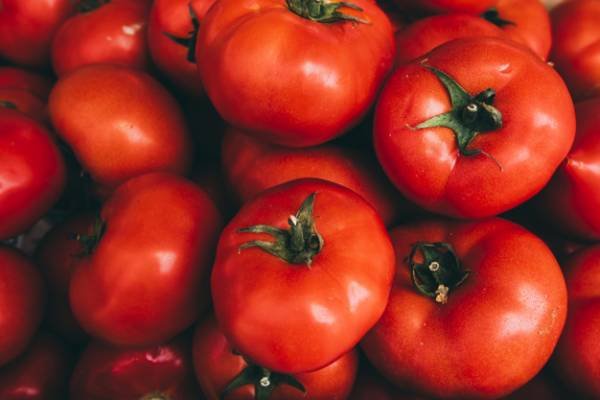
Further studies indicate that vitamin C can serve as exercise for the heart. Regular doses of vitamin C may disrupt the activity of a protein called endothelin, which leads to stiffness in small blood vessels and ultimately contributes to
heart attacks.Vitamin C can alsolower blood pressure
and keep arteries flexible.
Vitamin C can help create arteries under stress—this improves blood flow, subsequently enhancing the ability to carry oxygen. Another study from India indicates that fruits and vegetables rich in vitamin C can help prevent heart diseases. This study shows that a plant-based diet rich in vitamin C can lower blood cholesterol, reducing the risk of heart attacks by 2%.Vitamin C supplements also help lower serum cholesterol levels, which may be beneficial for cardiovascular disease.2. Regulates blood pressure
High doses of vitamin C can reduce blood pressure. This function of vitamin C may relate to its physiological and biological effects. Vitamin C acts as a diuretic, causing the kidneys to expel more sodium and water from the body—this reduces pressure on blood vessel walls.
Vitamin C also protects the body by providing nitric oxide, a known molecule for relaxing blood vessels. Taking vitamin C supplements at a dose of 500 mg daily can lower systolic blood pressure by 4 points and diastolic blood pressure by 1.5 percent over two months.3. Boosts immunityVitamin C deficiency reduces the body’s resistance to certain pathogens, as indicated in one study, where vitamin C boosts the power and protection of the immune system.

Besides protecting the immune system, vitamin C also reduces the severity of
various allergiesand combats infections. Vitamin C is beneficial for reducing the duration ofcolds.
Vitamin C may also potentially serve as treatment for asthma; however, more research in this area is needed.
4. May help prevent cancerNumerous laboratory studies have shown that high doses of vitamin C can reduce the growth ofprostateliver, colon, and other cancer cells. Higher concentrations of vitamin C might also assist in treating cancer.5. May assist in treating
arthritisVitamin C may help prevent some forms of arthritis. However, many may worsen arthritis conditions as suitable vitamin C doses prevent inflammatory arthritis and maintain healthy joints.Consuming vitamin C (90 mg per day for men and 75 mg per day for women) may worsen arthritis symptoms.
6. Improves eye health

Evidence also suggests that vitamin C intake may lower the risk of cataracts. Consumed with other essential nutrients, vitamin C can reduce eye damage; in fact, individuals with higher vitamin C intake have a 20% lower likelihood of developing cataracts.
7. May treat preeclampsia
Based on an American study, vitamin C may assist in treating preeclampsia (high blood pressure during pregnancy); however, further studies are essential. Oxidative stress can also be responsible for preeclampsia, and since vitamin C helps combat it, it might prevent this condition.
Vitamin C may also help end
unwanted pregnancies
(abortion).Some sources suggest that vitamin C can create heat in the uterus.8. Maintains healthy gumsVitamin C deficiency can lead to gum disease, a severe type (gum disease). This is because low vitamin C levels can weaken connective tissue and easily break small blood vessels. In fact, one early sign of vitamin C deficiency is bleeding gums. Vitamin C is essential for the health of teeth and gums.9. Helps treat allergies

It’s vital to understand that allergies occur when your body releases histamine, a biochemistry component. Vitamin C intake reduces histamine levels, thereby preventing allergies.
10.Reduces dry mouthSome sources believe that vitamin C helps prevent and even treat dry mouth. However, evidence in this area is limited.
11.Regulates blood sugar
Regular vitamin C intake (1000 mg) has shown potential in regulating blood sugar levels in type 2 diabetes patients, as vitamin C may also prevent damage related to diabetes. Additionally, vitamin C can reduce fasting blood sugar levels in type 2 diabetes patients.
12. Treats viral infections

According to several studies, high-dose vitamin C may be effective in treating allergies. Historically, these doses were used for treating infections such as
measles,
herpes, flushing, and viral pneumonia. This underscores vitamin C’s effect as an
antibioticthat combats harmful free radicals and aids in viral infections.13. Prevents scurvyAlthough rare today, scurvy affects individuals who do not consume sufficient vitamin C.14. Treats lead poisoning
Low vitamin C levels in the bloodstream are often associated with high lead levels. Regular vitamin C supplements help reduce blood lead levels in smokers. Another study suggests that vitamin C may decrease lead toxicity.15. FightsstrokesConsuming vitamin C-rich foods may help prevent strokes, especially hemorrhagic brain strokes. Vitamin C can lower blood pressure. Low levels of vitamin C may also increase the risk of spontaneous brain bleeding.Vitamin C, when paired with iron, may help reduce stroke risk. Moreover, according to a study, individuals with higher blood levels of vitamin C may reduce their stroke risk by 42%.
16. Improves mood
Studies involving patients have shown that adequate intake of vitamin C can enhance mood. Vitamin C supplements are also beneficial for reducing
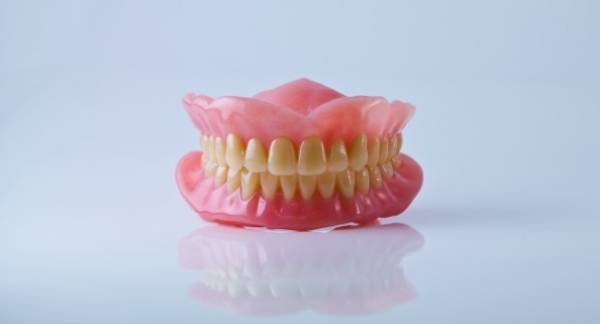
anxiety
in students.
17. Aids in weight lossInadequate vitamin C consumption may be a primary cause of related hair problems. Vitamin C deficiency can lead to dry hair. This condition is unfavorable for normal hair growth, ultimately resulting in hair loss.When the body consumes food, it uses glucose for energy production, naturally forming harmful free radicals. These free radicals can weaken, brittle, and thin the hair, inhibiting hair growth. The antioxidant properties of vitamin C reduce the formation of free radicals and minimize their impact on the body.
Adequate vitamin C intake in our diet is essential for protective antioxidant defense against free radicals. Previously, in the health section of SelMagz, it was stated that individuals who consume plenty of vitamin C have healthy, strong, and thick hair.
Fights dandruffHair follicles are often blocked due todandruff
and dry, flaky skin. This can damage the hair follicles and hinder hair growth. Vitamin C helps combat bacteria on the scalp, addressing dandruff, promoting follicle relaxation, and fostering the growth of new hair.Precautions regarding vitamin CVitamin C may cause stomach pain, tooth decay,chest pain,weakness, diarrhea,
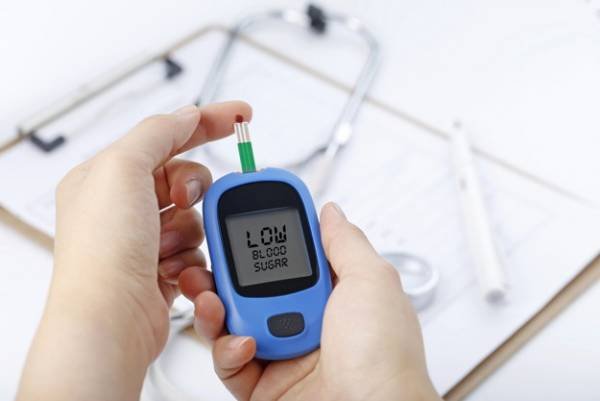
heartburn,
headaches, nausea, and esophageal issues. Should any of these symptoms arise, discontinue use and consult a physician.High doses of vitamin C can lead to vitamin C toxicity, resulting in blood clots,kidney stones,and other complications.Vitamin C consumption during
pregnancy
and breastfeeding is natural, but caution is advised when exceeding recommended dosages.
Any drug interactions with vitamin C:
Below is a list of medications that may interact with vitamin C (supplements):

AspirinAcetaminophen
Barbiturates
Chemotherapy medications
Birth control pills
Protease inhibitorsWarfarinAntacids

Some psychiatric medications like fluphenazine
Aluminum: Vitamin C consumption can increase aluminum absorption from medications containing aluminum, such as phosphate; this may be harmful to individuals with kidney issues.
Safety and side effects of vitamin C
Having mentioned all the properties and benefits of this vitamin in the health section of SelMagz, it’s now time to discuss its side effects; when consumed in appropriate doses, oral vitamin C supplements are generally considered safe. Side effects associated with oral vitamin C supplementation can include:

Nausea
Vomiting
Heartburn
Stomach inflammation potentially harming the esophagus (esophagitis)
Obstruction that keeps food or liquid from passing through the small or large intestine (intestine blockage)Stomach crampsFatigue

Headaches
Burning sensations
DiarrheaInsomnia
Skin burningIn some individuals, oral vitamin C consumption can potentially lead to the formation of kidney stones. Long-term use of vitamin C supplements exceeding 2000 mg per day increases the risk of significant side effects.Before any medical testing, inform your doctor that you are using vitamin C supplements. High levels of vitamin C may interfere with specific test results, such as stool tests for
blood testing.
Does excessive vitamin C pose a risk?

When derived from food and supplements within the recommended dosage, vitamin C is generally regarded as safe. Side effects are rarely reported, but symptoms can include diarrhea, nausea, abdominal cramps, and other gastrointestinal symptoms. Most healthy individuals can consume 200 to 250 mg of vitamin C daily while any excess is excreted through urine.
During illness, during recovery from injury, or under conditions of increased oxidative stress (including smoking), the body can utilize larger amounts. High vitamin C levels (over 2,000 mg per day) may contribute to kidney stones and also induce
severe diarrhea, nausea, and abdominal pain.
Are there any specific considerations regarding vitamin C use?Side effects may arise between vitamin C and anticoagulant medications such as warfarin (Coumadin), reducing their effectiveness. Productsnicotine

and
birth control medications
/ estrogen,
tetracyclines, barbiturates, and aspirin may reduce vitamin C levels.
Vitamin C may enhance iron and lutein absorption. Although some evidence suggests that high vitamin C levels may interfere with the absorption of vitamin B12 present in food, other studies show that it does not.
Vitamin C consumption tips
How to consume vitamin C?Benefits of vitamin CSources of vitamin C

Vitamin C for adults
Daily vitamin C requirementsVitamin C for childrenVitamin C intake in childrenSymptoms of vitamin C deficiencySigns of vitamin C deficiency
Vitamin deficiency in the bodyHow do I know if my body is low on vitamin C?Body bruisesWhat do body bruises indicate?Joint swelling

Why is my joint swollen?
Gum problems
- Gum diseases related to vitamin C
- Name of vitamin C deficiency disease
- Vitamin C and iron absorption
- Vitamin C deficiency disease tableVitamin C benefits for heart health
- Guava fruit
- Vitamin C-rich fruit
- Parsley vitamin C
- Parsley is rich in vitamin C
- Kiwi vitamin C
- Fruits rich in vitamin C

Vitamin C and papaya
Which fruit has the most vitamin C?
- Pineapple vitamin content
- What vitamin does pineapple contain?
- Grapefruit vitamin contentVitamin C in grapefruit
- Vitamin content in blackberries
- Vitamin C in black raspberriesVitamin content in tomatoesVitamin C in tomatoes
- Vitamin content in cherries
- Cherries contain vitamin C
- Essential for heart health
- Benefits of vitamin C for heart health
- Boost immune system
- Vitamin C for colds
- Arthritis pain
Treating joint arthritisVitamin C deficiency in the bodyBenefits of vitamin C for the body
Regulates blood sugarBlood sugar regulation with vitamin CVitamin C and stomach

Effervescent vitamin C
Children’s anxiety
Reducing children’s anxietyBoosting energyIncreasing energy with vitamin C
Foreign vitamin C tablets
Vitamin C for skinVitamin C in bodybuildingWhat effect does vitamin C have on eczema?Vitamin C beverageBenefits of vitamin C for hair growthVitamin C for hairFighting dandruff with vitamin C
Vitamin C for pregnant individuals



